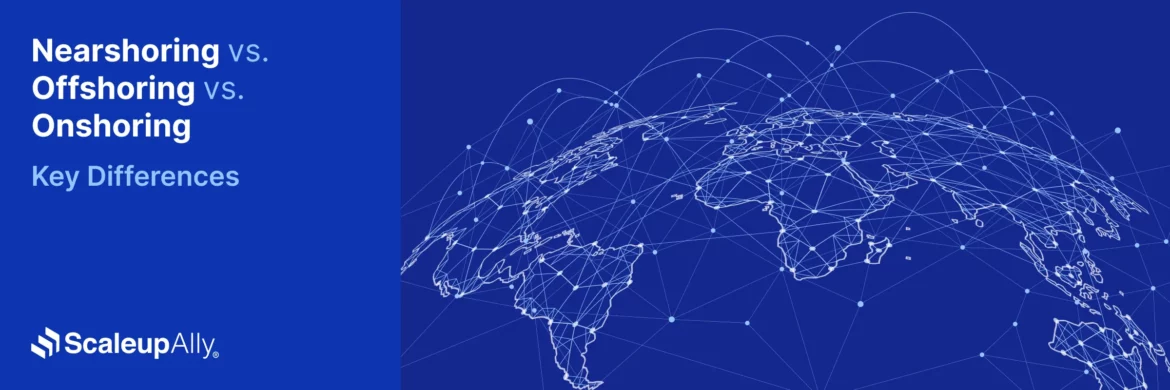
How to find an Offshore Web Development Team?
Suprabhat Sen | November 28, 2023 , 8 min read
Table Of Content
Hey there, fellow digital voyager! So, you’ve set sail on the vast ocean of online business and realized you need a crack team of developers to navigate these virtual waters. Whether you’re a startup seeking tech expertise or an established enterprise eyeing expansion, finding the right offshore web development crew can feel like searching for buried treasure.
Fear not, because in this blog expedition, we’re going to be your trusty navigators, guiding you through the choppy seas of options and strategies to find that elusive gem of an offshore web development team. From deciphering the map of skills and expertise to avoiding the treacherous reefs of miscommunication, we’ve got your back!
So, hoist the sails, sharpen your spyglass, and let’s chart a course together towards discovering the ideal offshore web development crew that’ll help you conquer the digital realm!
What is an offshore Web Development Team?
- What is an offshore Web Development Team?
- Types of Offshore Web Development Teams
- How to find an offshore development team?
- Benefits of Offshoring Web Development
- How to Evaluate Offshore Development Teams?
- How to Manage Offshore Development Teams?
- Offshore Web Development Destinations
- Conclusion
- Frequently Asked Questions
An offshore web development team refers to a group of skilled professionals located in a different geographical location than the hiring company. These teams are responsible for designing, developing, and maintaining websites or web applications remotely. By leveraging the global talent pool, businesses can tap into a diverse range of skills without the constraints of local boundaries.
Types of Offshore Web Development Teams
Before we dive into the specifics, let’s skim the surface of the offshore web development landscape. From dedicated teams that work exclusively for you to project-based groups offering specialized skills, the options are as diverse as the digital seas themselves. Now, let’s set sail and explore the types of offshore web development teams that await!
- Outsourced Teams: Companies can choose to outsource entire projects to a third-party offshore software development team. This is ideal for businesses that require a complete, end-to-end solution without the need for constant in-house supervision.
- Dedicated Teams: A dedicated offshore development team works exclusively for a single client. This model allows for more direct control and collaboration, fostering a sense of unity despite the physical distance.
- Freelancers: Hiring individual freelancers is another option, providing flexibility in terms of skillsets and project scopes. However, managing multiple freelancers can be challenging, requiring effective project management.
How to find an offshore development team?
When scouting for an offshore development team, start by researching reputable companies, reading client reviews, and assessing portfolios. Ensure clear communication channels and alignment of project goals before diving into partnership waters.
- Define Your Requirements: Clearly outline your project requirements, including the technology stack, expected deliverables, and project timeline. This will serve as a guide during the selection process.
- Research Potential Teams: Explore reputable outsourcing platforms, review websites, and industry forums to identify potential offshore web development teams. Look for teams with a proven track record and positive client testimonials.
- Evaluate Technical Expertise: Assess the technical expertise of the offshore team by reviewing their portfolio, past projects, and client references. Look for teams that have experience in your industry or niche.
- Communication and Time Zone Compatibility: Effective communication is crucial for successful collaboration. Ensure that the offshore team is proficient in your preferred communication tools and has a reasonable overlap in working hours with your team.
- Consider Cultural Fit: Cultural alignment can impact collaboration. Choose a team that shares similar values and work culture to minimize misunderstandings and enhance cooperation.
- Budget Considerations: While cost savings are a significant advantage of offshoring, it’s essential to strike a balance between budget considerations and the quality of work. Be wary of extremely low-cost options that may compromise on quality. A good first step is to calculate offshore development cost early in planning — this helps you prioritise features, set realistic milestones, and avoid budget surprises.
Benefits of Offshoring Web Development
Offshoring web development brings cost-efficiency and access to diverse talent pools. It enables businesses to scale faster and leverage specialized skills while focusing on core operations. Now, let’s dive into the varied types of offshore web development teams!
- Cost Efficiency: Offshore development often provides access to highly skilled professionals at a fraction of the cost compared to hiring locally.
- Access to Global Talent Pool: Offshoring allows businesses to tap into a diverse and extensive talent pool, bringing in specialized skills that may not be readily available locally.
- Faster Time-to-Market: With the ability to work around the clock, offshore teams can expedite project timelines, enabling faster delivery of products and services.
- Focus on Core Competencies: Outsourcing non-core functions like web development allows businesses to concentrate on their core competencies and strategic objectives.
How to Evaluate Offshore Development Teams?
Evaluating an offshore team is another crucial step that you should take to make sure you make the correct decision.
Here are a few ways in which you can evaluate an offshore development team:
- Technical Expertise: Assess the team’s technical skills and expertise by reviewing their portfolio, case studies, and client testimonials. Look for teams that have experience in your industry or niche.
- Communication and Collaboration: Effective communication is essential for successful collaboration. Evaluate the team’s proficiency in your preferred communication tools and their ability to understand and execute your project requirements.
- Quality Assurance: Ensure that the team has robust quality assurance processes in place. Look for teams that prioritize testing and have a track record of delivering high-quality products.
- Project Management: Evaluate the team’s project management capabilities, including their ability to meet deadlines, manage resources, and provide regular updates on the project’s progress.
- Cultural Fit: Consider the team’s work culture and values to ensure a smooth collaboration. Look for teams that align with your company’s values and have a similar work ethic.
How to Manage Offshore Development Teams?
You can successfully manage an offshore development team in the following ways:
- Establish Clear Communication Channels: Set up regular communication channels, such as video calls, instant messaging, and project management tools, to facilitate seamless communication between your team and the offshore developers.
- Define Project Goals and Expectations: Clearly define project goals, deliverables, and expectations to ensure that both teams are on the same page. Regularly communicate project updates and address any concerns or issues promptly.
- Provide Clear Documentation: Provide comprehensive documentation, including project requirements, design specifications, and technical guidelines, to ensure that the offshore team has a clear understanding of the project.
- Regular Progress Reviews: Schedule regular progress reviews to assess the team’s performance, address any challenges, and provide feedback. This will help ensure that the project stays on track and meets the desired outcomes.
- Build Trust and Collaboration: Foster a sense of trust and collaboration by treating the offshore team as an extension of your in-house team. Encourage open communication, recognize their contributions, and involve them in decision-making processes.
Offshore Web Development Destinations
When it comes to offshore web development, India shines as a premier destination. Boasting a vast pool of highly skilled developers and competitive pricing, India stands out for its expertise across diverse tech domains, from e-commerce to custom software solutions.
While India’s time zone difference may pose some challenges for real-time collaboration, its adaptability, efficient communication, and English proficiency among developers often bridge this gap.
However, other regions like Eastern Europe (Ukraine, Poland, Romania) offer strong technical expertise, while Latin American countries (Mexico, Argentina, Brazil) provide proximity and favourable time zones for easier collaboration with the United States.
Conclusion
Finding the perfect offshore web development team demands a careful blend of technical expertise, communication, cultural alignment, and budget considerations.
So, as you venture forth, armed with newfound knowledge and strategies, may your quest for the ideal team be rewarding and fruitful. Sail forth, and may the winds of innovation guide you to prosperous shores!
Partner with ScaleupAlly for expert driven web development services — your trusted choice for outsourcing web projects.
Frequently Asked Questions
Q1: Why should I consider offshore web development for my project?
Offshore web development offers cost efficiency, access to a global talent pool, faster time-to-market, and the ability to focus on core competencies. It’s a strategic approach for businesses seeking skilled professionals beyond local boundaries.
Q2: What is the difference between outsourced teams, dedicated teams, and freelancers?
Outsourced teams handle entire projects independently, dedicated teams work exclusively for a single client, and freelancers provide flexibility but require effective project management due to their individual nature.
Q3: How do I define my project requirements for an offshore development team?
Clearly outline your project’s technology stack, expected deliverables, and timeline. This document serves as a guide during the selection process, ensuring alignment with your business objectives.
Q4: Where can I find potential offshore web development teams?
Explore reputable outsourcing platforms, review websites and industry forums. Look for teams with a proven track record, positive client testimonials, and experience in your industry or niche.
Related Blogs

Nearshoring vs. Offshoring vs. Onshoring: Key Differences
Discover the key differences between nearshoring, offshoring, and onshoring. Learn the benefits, challenges, and how to choose the best outsourcing strategy for your business.
webadmin
Feb 13 ,
6 min read

Top 20 Emerging Technologies of 2026
Discover the top 20 emerging technologies of 2026. Explore which innovations are driving change across healthcare, finance, manufacturing, and other crucial industries.
ScaleupAlly Team
Dec 16 ,
9 min read

Software Development Timeline: Phases, Duration & Estimation Guide
Understand the software development timeline with phase durations, key factors, hidden delays, and practical methods to estimate project time.
Suprabhat Sen
Nov 29 ,
16 min read


